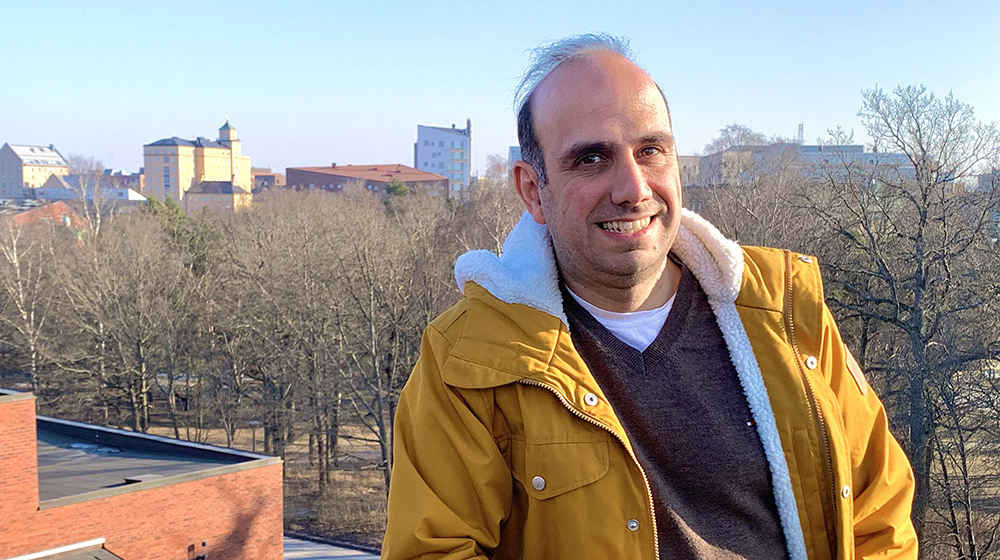“Impact is the reason for our existence”

Almost everything we do at KTH lead to societal improvement, or impact. Hatef Madani, impact leader at ITM, wants the concept to be part of our daily mindset and he’s eager to help researchers increasing their impact. And for those who have missed what KTH’s impact group do - here’s the text for you.
“You will get all department’s publication information after this talk.” A handful of PhD students in a lecture room are listening to Hatef Madani explaining why it matters in what journal they publish their research results. It’s about reaching out to the right audience. Getting citations. Making results known for as many as possible. And in the end, to improve KTH’s attractiveness and ranking compared to other international universities.
Hatef Madani is the so-called impact leader at ITM, and this very day, his task is to encourage the students and present faculty to have a well-thought-through publications strategy. This topic is part of his impact work.
“It’s an obvious fact that all we do at KTH lead to societal improvement, or impact. This is the whole reason for KTH’s existence, and we want to have an impact on society: provide students with knowledge that make a difference; produce research results that can improve our society. The impact group’s task is to remind us of why we do what we do so we remember our aim – all the time”, Hatef says.
A need to show the impact
KTH has actively been working with impact as a term since 2012. KTH's five schools have at least one impact leader and one communicator dedicated to the project. A few times every semester, the teams meet to inspire and learn from each other.
The goal is clear: to create and communicate KTH’s societal impact. And to spread knowledge so that more people can gain from it.
“It is also a growing pressure that academics go beyond the scientific communities to show how they influence the society by having impact on industry or policy makers.”
It was a bit unclear how ITM should work with impact from the start, Hatef explains. Especially since each school at KTH makes up its own priorities. With time ITM has increasingly worked with action plans guided by the dean.
“One year we focused on finding good impact stories, or cases, another year RAE and last year we made an effort for KTH’s ranking through improving our publication strategies, which was identified as a low hanging fruit.“
But the impact teams can also come up with their own initiatives. Hatef has, for example, arranged a pilot event for alumni from the energy master program, with some help from KTH’s alumni organization and program directors.
“I wanted to understand how we can enhance our collaboration with former students, now successfully working around the world, and how we can use their knowledge and experience in the educational system.”
Partnerships essential
Topics during KTH’s impact group’s meetings vary, lately the group has had an extra focus on KTH’s co-operations, for example, with industry, authorities and municipalities. Partnerships are an essential piece of the puzzle for getting societal impact. In collaborations, KTH can develop relevant solutions for the challenges we are facing today - and get them out in practice faster.
“Here there’s room for improvement. Sometimes, our strategic partnership does not go beyond the partnership steering group. Instead, we should explore the potential by reaching out to our faculties and looking for interdisciplinary research topics. Then more innovative ideas can emerge.”
Hatef points out that the impact leaders can help with advice on short- or long-term impact strategies. Impact is complex and can take years to manifest. Departments and individual researchers who want to know what they can do to increase their impact can contact him.
“My main task as an impact leader is to discuss it – with head of divisions, departments, faculty, PhDs… The discussion in itself is not trivial; it puts impact as a part of our agenda all the time then it eventually becomes the mindset.”
“But our small impact team is available for all types of support – from sharpening impact cases to devising long term strategies. There is no one-size-fits-all solution here. At the same time impact should not be considered as a burden to our faculties. We don’t want to add to the daily tasks, it is all about the mindset and the work culture. As KTH employees, we have a societal impact to some extent through our research or education. It’s more a matter of how to enhance it and communicate it.”
Text: Anna Gullers
